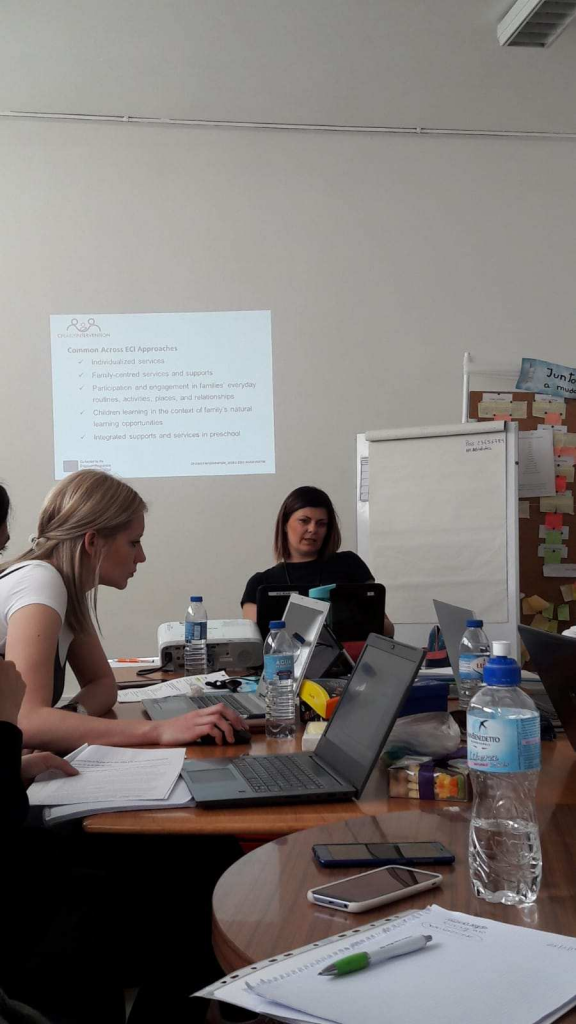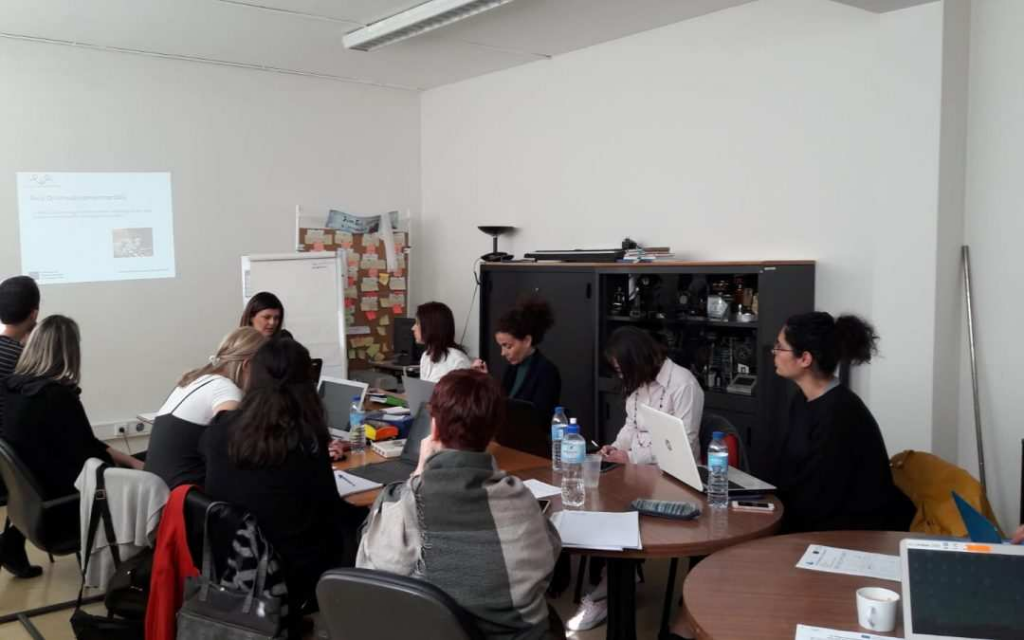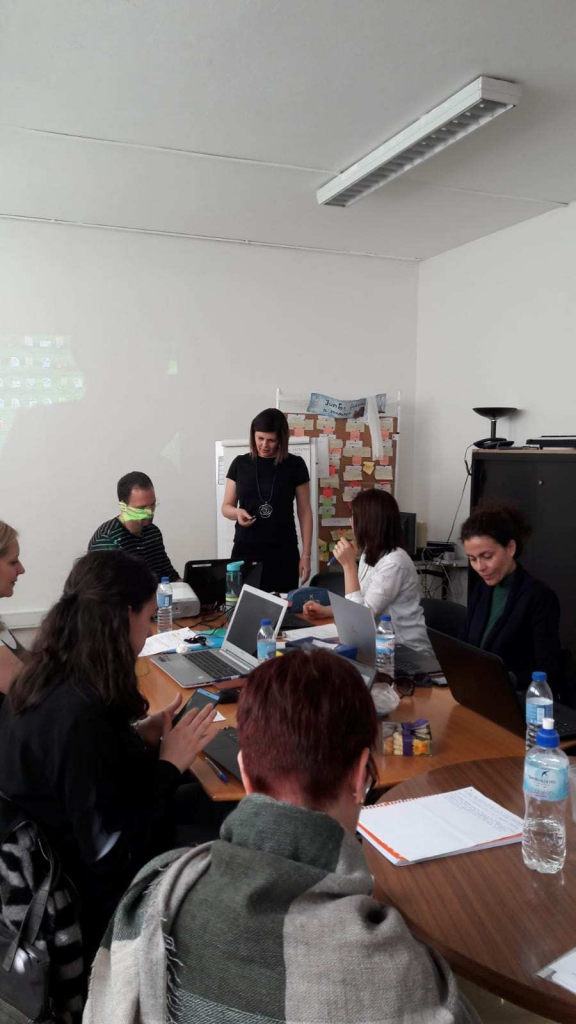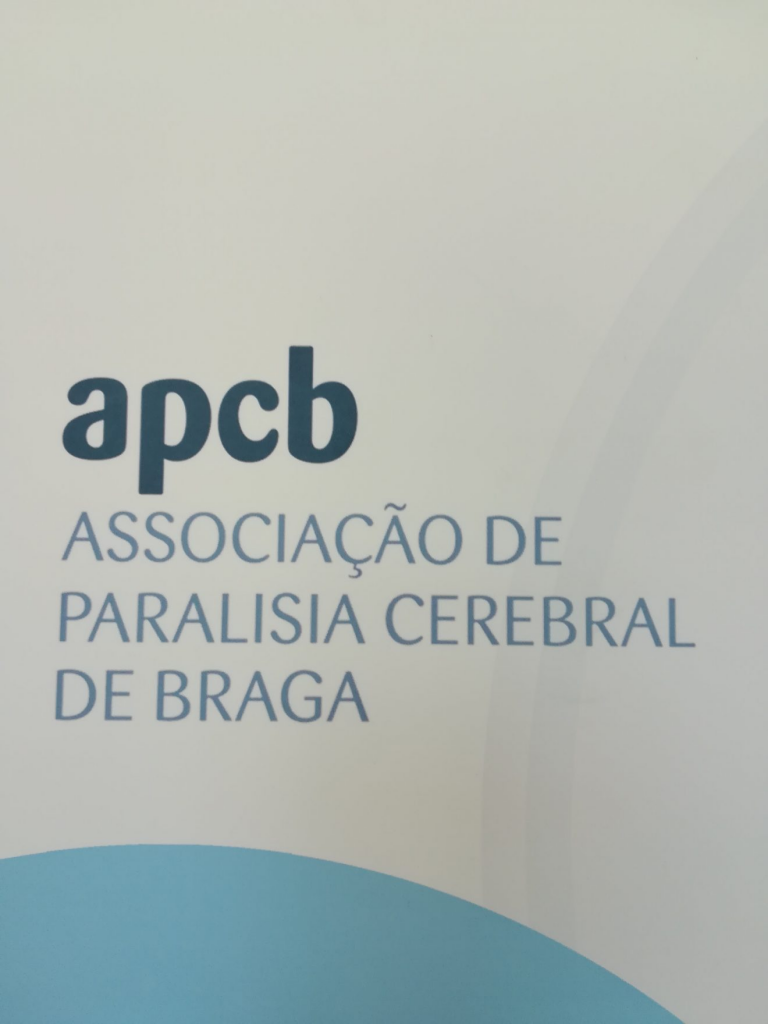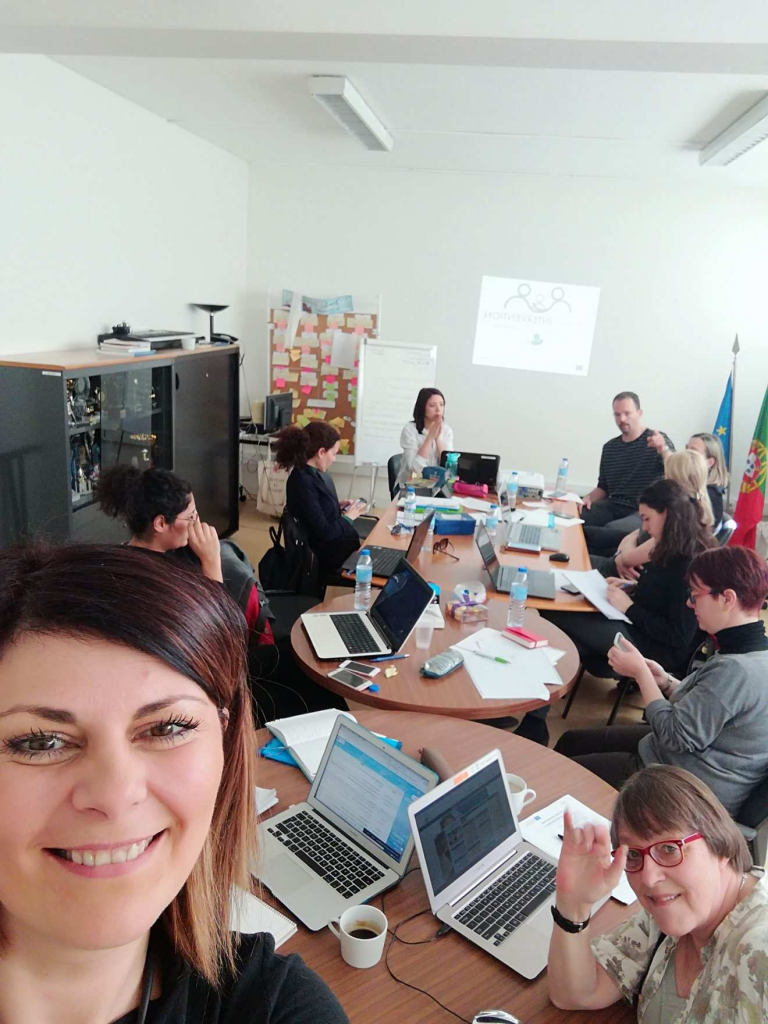Dear colleagues,
In this newsletter we will inform you about AVAPACE Erasmus+ project meeting in
Braga, Portugal:
CP-EARLY INTERVENTION_ 2018-1-ES01-KA204-050736
CP-EARLY INTERVENTION
Meeting : BRAGA, PORUGAL
Dates; 28th& 29th March 2019
Venue: APCB
Address; Dr. Feliciano Ramos Street, 10 – 4700-378 Braga
Attendants: AVAPACE (Spain), EURLYAID, Il CERCHIO(Italy), APCB (Portugal), DAAS
(IT Spain), HURT (Croatia)
Participants from EURLYAID
- Noor van Loen (EURLYAID)
- Marga Cañadas (EURLYAID)
- Snezana Ilic (EURLYAID)
Day 1; 28th March 2019
INTRODUCTION PRESENTATION
EURLYAID presented fundamental importance of paradigm shift to family-centered
practices, the changes related to: importance of the family, the functional assessment
of the child, transdisciplinary team work in ECI and point on collaborative relationship,
intervention in natural environments and the impact of the intervention
EURLYAID will support “State of art” training in CP-EARLY INTERVENTION (Based
on the contributions of the partners regarding bibliographic references)
Until June 30th 2019, all partners will present the state of early care in their countries,
in relation to family-centered practices.
PRESENTATION OF PARTNERS ABOUT CO-CREATION SESSION
Every presenter, Project team member Explanation about:
- Who were the participants?
- How was the Families ́ satisfaction?
- How was the adult ́s satisfaction?
- How was the professional’s satisfaction?
- How was the teacher assessment?
- Which topic information was more relevant in the co-creation session?
- General Conclusions
APCB: They have difficulties to change mentalities in Medical professional, for that
reason, they proposed add in the training pediatricians or other medical profile
professional in relationship with family based ECI practice.
- A mother states that in the initial phase it is essential for parents to be aware of strategies that promote development, as well as care for the first-aid, for example, hygiene of a baby with a catheter, tracheostomy, or other device.
- According to parents, it is important when the child is diagnosed to have someone to guide them. For this reason the EI should start even in the NICU, in order to guide and empower the family. Routing should be done as soon as they identify the clinical condition.
- Important to provide links to deepen all the topics in order to have an informative database, whenever necessary.
- Sessions should be all together
- Optional live streaming for people who have mobility problems or parents that cannot leave the house.
HURT: It was hard to find participants for the Co-created sessions, because families’
don ́t understand this paradigm “Family Centered Practices”, especially in smaller
cities.
They did three sessions in different cities: Split, Zagreb and Krapina.
Families’ satisfaction – in general
- Lack of teamwork no interdisciplinary co working among experts (lack of commonly defined goals, opinions and jointly interventions)
- Lack of info centre about important information
- No parenting awareness of their role in the ECI support
- No support to parenting skills (most of the instructions of the “rehabilitation team” are verbal,no modeling, no coaching work, parent faces difficulties)
- Lack of support in importance of emotional attachment, play in first year, feeding, oral hygiene, toilet training etc.
- Lack of support group for parents and the whole families (including brothers and sisters of children with CP)
Adults satisfaction – in general
- Persons with CP are undervalued as a members of support for new families of children with developmental delay & disability
- Training materials for coaching are essential as there is a lack of self esteem among population of adults with CP
Professional’s satisfaction – in general
- Need for education in family-centered practices ; used to have parents outside of “therapy” rooms
- Great opportunity to have an online training program as there is lack of opportunities for education
- Topic to add: How to make client centered, goal setting process, how to do work with “hard” clients, how to enable proactive parents
IL-CERCHIO: They want to deepen on some issues about, 1) activate the network
support for diagnosis, to feel less alone, and 2) more support from pediatrician. About
the topics, they think that the training should have more empathy on professional
empowerment, and improve the program with regular meetings with the entire targets
group.
Which topic information was more relevant in the co-creation session?
The participants in survey reported that it would be important for them to deepen the
following issues:
- it would be important that the support network was activated at the time of diagnosis so as to make people feel less alone and able to handle the complex situation. The participants proposed to dedicate a space to write together a guide to give to pediatricians for this purpose.
- The participants propose to expand the network of participants in this project to more professional figures like pediatricians.
AVAPACE: They considered that the most important DETA were “Let ́s talk the same
language” and “emotional Intelligence”.
General Conclusions
- Training Emotional Intelligence
Families said: Start the intervention working on emotional intelligence, emphasizing on
the assimilation of the diagnosis and how to overcome the situation.
Mentors said: How to transmit my story of overcoming and life experience
Professionals said: Tools to escort the family in the process. - Training communication and cooperation skills
- Make families aware of their rights, their knowledge, and self-efficacy (professional feedback)
- How to talk with other professionals
- Let’s Talk the Same Language
- When families arrive at FCEI they feel confused due to the lack of contact between
the professional and the child. The families expect professionals to act directly on the child. - At the beginning more information about the paper of the reference professional, the
family rol.. etc. - To know clearly the expectation about the child evolution.
- The importance of the parents individual needs.
-The families need to learn that “more is not always better” in order to decrease the
feeling of guilt and the high level of requirements/exigency.
- –How to improve or boost my support network
Families said:Take into account the paper of the social worker, and sanitary
professionals. As far as I can demand? What can they give me?
Leisure time for little kids with the same situation.In the end, other families support
network are important.
Mentors said: Establish a network between mentors to share experiences - Would you help me to become a Mentor?
Mentors said: Very important, to send on a message of confidence and serenity (tools
and skills) Mentors learn how to manage their personal resources. The big question,
what kind of help am I for the families?
Child Develop in regular way and Child with CP Develop
Natural child development and red flags. Differentiate behaviors that are natural to children and others that are more specific to some alteration (language, autism,
behavior …)
All Project partners sharing and decision making of each DETA
CONCLUSIONS ABOUT DETA
CONTENTS:
- The DETA 0 we can introduce it in Let ́s talk the same language.
- If we focus on the transdisciplinary work, is easy to justify because everyone can have the same base, and focus over Functional development different concept with development areas.
- To change the order to pay more attention on the process families. The new order will be:
- DETA 1. EMOTIONAL INTELLIGENCE
- DETA 2. COMMUNICATION AND COOPERATION
- DETA 3. LET ́S TALK THE SAME LANGUAGE
- DETA 4. RELATIONAL AND PARTICIPATIVE PRACTICES
- DETA 5. HOW TO IMPROVE OR BOOST MY
- DETA 6. WOULD YOU HELP ME TO BECOME A BETTER MENTOR
- “We think the need to extend the training to health social and educational professionals”. All DETA will be open for every professional. Also, DETAs will be offered for all target group (families, professionals, and adults with CP)
- Face to Face (real and online at the same time) and online video training for everyone.
- For each DETA one face to face, and several videos and online sessions. We have the possibility in our platform.
- Some tools in the DETA 3 “Let’s talk the same language” include SATIRE. Pay attention to what moment is the family, their emotional process. The professional has to be aware and hear and observe.
- DETA 1. Training Emotional Intelligence
- DETA 2. Training Communication and Cooperation Skills
Positive report. We want to change de concept needs and deficiencies into strength or challenge. - DETA 3. Let’s talk the same language.
- We start talking about functional assessment.
- DETA 4. Training Relational and Participatory practices: Pay attention in participative practices, we have a lack of that content.
- People got confused about this DETA and DETA communication and
- cooperation skills
- DETA 5. How to improve or boost my support network?
- It is not relevant for some countries. One important thing is one of our goals isthe empowerment the family. The mobilization of support of the resource is VERY IMPORTANT.
- Which is the law of every country? We need to look for information about social educational and health law in every country
- We have to think about making a guide to help the families to look for information about all the services they can go and get (social, health and educational).
- DETA 6. Would you help me to become a Mentor?: The most important thing is to define the profile of the mentors. What do they need to do with/to the families?
Web Presentation and Platform E-Learning requirements (DASS)
DASS presented us the advances in CP-EARLY INTERVENTION Web, and we tolk
about the platform, as well as the requirements that it needed for the next steps of
development.
Dissemination Plan
Give approval to the leaflet to translate it into other languages
Need to include in our website all our dissemination actions.
At the end of two days meeting we had Presentation of main activities developed
by BRAGA CEREBRAL PALSY ASSOCIATION.


